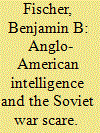| Srl | Item |
| 1 |
ID:
111183


|
|
|
|
|
| Publication |
2012.
|
| Summary/Abstract |
During the Soviet war scare of the 1980s, British intelligence shared vital information from KGB officer Oleg Gordievsky with its American partners. The US intelligence community, however, was suspicious of the message and the messenger, dismissing Soviet 'war talk' as disinformation. Some officials even believed that the British had tweaked their reports to influence US policy. President Ronald Reagan, however, on the advice of Prime Minister Margaret Thatcher, listened to Gordievsky rather than his intelligence advisors. The war scare had a profound influence on Reagan's thinking about nuclear war, Kremlin fears, and Soviet-American relations that led him to seek a new détente with Moscow and the end of the Cold War through diplomacy rather than confrontation. Subsequent events and post-Cold War revelations vindicated Gordievsky. Reagan sought his advice on the eve of his first summit meeting with Mikhail Gorbachev and later expressed his gratitude during a private meeting in the Oval Office.
|
|
|
|
|
|
|
|
|
|
|
|
|
|
|
|
| 2 |
ID:
108722


|
|
|
|
|
| Publication |
2011.
|
| Summary/Abstract |
The study of the Cold War has undergone a significant transformation in recent years, with new critical perspectives, sources and debates. The nuclear history of the Cold War has begun to yield new insights on fundamental questions about the stability and dynamics of the confrontation. Recent evidence about the events of 1983 provides an opportunity to explore the risk of nuclear war and the role of misperception in Soviet-American relations during the 'Second Cold War'. Central to this is the study of intelligence. This article examines episodes in the autumn of 1983, notably the Able Archer 'crisis' of November 1983. Attention focuses on aspects of Soviet, American and British intelligence. Political and diplomatic consequences are also considered. A principal aim is to emphasize that we are at an early stage in researching and understanding events, and that a number of assumptions about the crisis require further exploration. Broader lessons about the role of intelligence in the Cold War are nevertheless explored and provisional conclusions reached about the performances of intelligence agencies and communities.
|
|
|
|
|
|
|
|
|
|
|
|
|
|
|
|